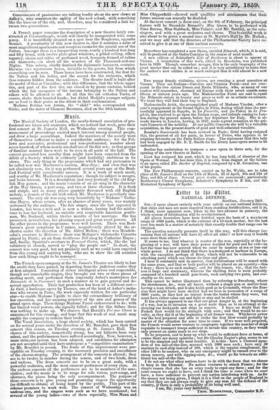Music.
The Musical Society of London, the newly-formed association of pro- fessional mu icians and amateurs, which we noticed last week, gave their first concert at St. James's Hall, on Wednesday evening. This com- mencement of proceedings excited much interest among musical people, and drew a large assemblage. Indeed the members of the society were of themselves sufficient to make a considerable audience ; for the Fel- lows and associates, professional and non-professional, number about seven hundred, of whom nearly one-half are of the fair sex ; so that groups of familiar musical faces were to be seen in all parts of the hall. The concert presented less novelty than might have been expected from the debut of a Society which is evidently (and laudably) ambitious in its views. The only thing in the programme which had any pretension to be called new was Macfarren's cantata, May-Day; and even that was not absolutely new, for it was performed several years ago at the Brad- ford Festival with considerable success. It is a work of much merit, and worthy of Mr. Macfarren's reputation ; though its subject is meagre, and lacks interest. It is a description (not very poetical) of the old Eng- lish May games ; and the music consists of an air sung in the character of the May Queen, a part-song, and two or three choruses. It is fresh and silage, and in many places quaintly flavoured with old English melody, a branch of the art with which Mr. Macfarren is peculiarly con- versant. The only air was sung very beautifully by " Madame " Cathe- rine Hayes, whose return, after an absence of many years, was warmly welcomed by the audience. The fair singer, since she last appeared in London, has been a wife and is now a widow, having had the misfor- tune to lose her husband, an amiable and respectable American gentle- man, Mr. Bushnell, within twelve months of her marriage. She has preserved, nevertheless, her pleasing aspect and great vocal powers. Al! the other pieces in the programme were well known. There was Beet- hoven's great symphony in C minor, magnificently played by the or- chestra under tbe direction of Mr. Alfred Mellon ; there was Mendels- sohn's overture to Mclusine ; there was Molique's violoncello Concerto played by Piatti ; ad air from Guillaume Tell sung by Catherine Hayes ; and, finally, Spontini's overture to Fernand Cones, which, like the last voluntary at church, served to "play the people out." In short, the concert was very good, but not precisely such as we could have expected from this young and aspiring body, who are to show the old societies how such things ought to be managed.


























 Previous page
Previous page